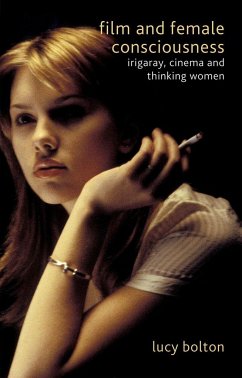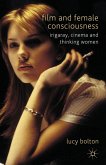Film and Female Consciousness analyses three contemporary films that offer complex and original representations of women's thoughtfulness and individuality: In the Cut (2003), Lost in Translation (2003) and Morvern Callar (2002). Lucy Bolton compares these recent works with well-known and influential films that offer more familiar treatments of female subjectivity: Klute (1971), The Seven Year Itch (1955) and Marnie (1964). Considering each of the older, celebrated films alongside the recent, unconventional works illustrates how contemporary filmmaking techniques and critical practices can work together to create provocative depictions of on-screen female consciousness.
Bolton's approach demonstrates how the encounter between the philosophy of Luce Irigaray and cinema can yield a fuller understanding of the fundamental relationship between film and philosophy. Furthermore, the book explores the implications of this approach for filmmakers and spectators, and suggests Irigarayan models of authorship and spectatorship that reinvigorate the notion of women's cinema.
Bolton's approach demonstrates how the encounter between the philosophy of Luce Irigaray and cinema can yield a fuller understanding of the fundamental relationship between film and philosophy. Furthermore, the book explores the implications of this approach for filmmakers and spectators, and suggests Irigarayan models of authorship and spectatorship that reinvigorate the notion of women's cinema.
'Film and Female Consciousness opens up enticing fresh horizons for the feminist and philosophical study of authorship and spectatorship in cinema.' - Annette Kuhn, Queen Mary, University of London, UK
'Entering into the seriously playful spirit of Luce Irigaray's work, Lucy Bolton shifts the signifier of the cinematic from womenslaughter to women's laughter. Putting the 'close' into close reading, Bolton attends to the haptic strategies by which Jane Campion, Sofia Coppola and Lynne Ramsay intimate their female protagonists' Irigarayan becoming. Gestural, chromatic, musical, and tactile communion are echoed in Bolton's lucid readings, which will inspire future filmmakers, as well as film theorists, of all genders to enter, like Frannie, Charlotte and Morvern, a hopeful, feminist future.' - Sophie Mayer, author, The Cinema of Sally Potter
Film and Female Consciousness is a fresh and engaging approach to what is often considered a well-trodden and even passé subject in film studies. Bolton's book suggests a potential methodology for the future of feminist film criticism in a way that opens up new directions in a discipline that had contented itself with circuitous discussions surrounding the dearth of interesting and new representations of female subjectivity, identity and interiority in mainstream female characters. - Alexia Bowler, Feminist & Women's Studies
'Entering into the seriously playful spirit of Luce Irigaray's work, Lucy Bolton shifts the signifier of the cinematic from womenslaughter to women's laughter. Putting the 'close' into close reading, Bolton attends to the haptic strategies by which Jane Campion, Sofia Coppola and Lynne Ramsay intimate their female protagonists' Irigarayan becoming. Gestural, chromatic, musical, and tactile communion are echoed in Bolton's lucid readings, which will inspire future filmmakers, as well as film theorists, of all genders to enter, like Frannie, Charlotte and Morvern, a hopeful, feminist future.' - Sophie Mayer, author, The Cinema of Sally Potter
Film and Female Consciousness is a fresh and engaging approach to what is often considered a well-trodden and even passé subject in film studies. Bolton's book suggests a potential methodology for the future of feminist film criticism in a way that opens up new directions in a discipline that had contented itself with circuitous discussions surrounding the dearth of interesting and new representations of female subjectivity, identity and interiority in mainstream female characters. - Alexia Bowler, Feminist & Women's Studies
'Film and Female Consciousness opens up enticing fresh horizons for the feminist and philosophical study of authorship and spectatorship in cinema.' - Annette Kuhn, Queen Mary, University of London, UK
'Entering into the seriously playful spirit of Luce Irigaray's work, Lucy Bolton shifts the signifier of the cinematic from womenslaughter to women's laughter. Putting the 'close' into close reading, Bolton attends to the haptic strategies by which Jane Campion, Sofia Coppola and Lynne Ramsay intimate their female protagonists' Irigarayan becoming. Gestural, chromatic, musical, and tactile communion are echoed in Bolton's lucid readings, which will inspire future filmmakers, as well as film theorists, of all genders to enter, like Frannie, Charlotte and Morvern, a hopeful, feminist future.' - Sophie Mayer, author, The Cinema of Sally Potter
Film and Female Consciousness is a fresh and engaging approach to what is often considered a well-trodden and even passé subject in film studies. Bolton's book suggests a potential methodology for the future of feminist film criticism in a way that opens up new directions in a discipline that had contented itself with circuitous discussions surrounding the dearth of interesting and new representations of female subjectivity, identity and interiority in mainstream female characters. - Alexia Bowler, Feminist & Women's Studies
'Entering into the seriously playful spirit of Luce Irigaray's work, Lucy Bolton shifts the signifier of the cinematic from womenslaughter to women's laughter. Putting the 'close' into close reading, Bolton attends to the haptic strategies by which Jane Campion, Sofia Coppola and Lynne Ramsay intimate their female protagonists' Irigarayan becoming. Gestural, chromatic, musical, and tactile communion are echoed in Bolton's lucid readings, which will inspire future filmmakers, as well as film theorists, of all genders to enter, like Frannie, Charlotte and Morvern, a hopeful, feminist future.' - Sophie Mayer, author, The Cinema of Sally Potter
Film and Female Consciousness is a fresh and engaging approach to what is often considered a well-trodden and even passé subject in film studies. Bolton's book suggests a potential methodology for the future of feminist film criticism in a way that opens up new directions in a discipline that had contented itself with circuitous discussions surrounding the dearth of interesting and new representations of female subjectivity, identity and interiority in mainstream female characters. - Alexia Bowler, Feminist & Women's Studies








